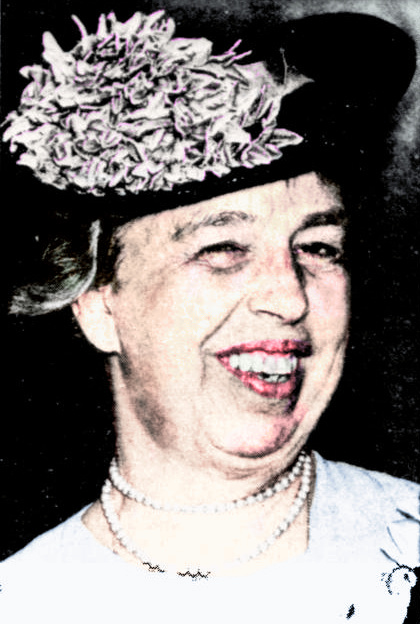
MY DAY
By Eleanor Roosevelt
February 1, 1941
Washington, Friday –
Yesterday, Sister Providencia, a daughter of Congressman Tolan, held an exhibition of work done by the Indians in the Pacific Northwest reservations, in the Indian Affairs Committee Room at the Capitol. Sister Providencia has been at work five years and she has succeeded in reviving some of the old arts and crafts among these people and adapting them to the modern market.
Their gloves are a joy, soft and warm, and anyone who lives a country life would be most thankful to possess a pair. I was late for my appointment and rather afraid that the exhibition might be closed. But I found that the room was still crowded with people, which shows that there is active interest in this type of handwork.
The President’s birthday dinner last night was a great success. We had, as usual, an abundance of amateur talent displayed by every member of the group. Our only professional entertainment was provided by Mr. Lauritz Melchior, who sang a group of songs for us which lifted us far above our usual level of fun and entertainment. We are all grateful to him for a very delightful interlude.
Everyone at the table contributed something in the way of admonition, inspiration or affection, so that at least during this dinnertime the President must have felt that he was having a personal birthday celebration.
I feel, occasionally, that this day has become such a collective birthday party, that the personal side of it has rather slipped away. But the small group who have attended these reunions ever since 1921, reminded the now augmented gathering last night that this was the twentieth year we had met together on this occasion. Many of those years had no connection with public functions, therefore, it is only right that a short period of this day should be devoted to a purely personal celebration.
As soon as dinner was over, I started to visit the different Birthday Balls. It seemed to me that the crowds were larger and more enthusiastic than usual. I met the different stars at various hotels and cut a most beautiful creation of a birthday cake at the Wardman-Park Hotel.
Then I dashed back to the White House in time to join those stars who were able to be there during the President’s broadcast. They continued on their rounds after the broadcast was over, but I went gratefully to bed, and actually had a little time to read an article by Irwin Ross in Harper’s Magazine of January 1941. I collect articles that I want to read and am always several months behind. This one, however, was well worth keeping.
Today is a much more peaceful day. I hope from now on, since the busiest month of the year has come to a close, that we shall lead a quieter and more reasonable life in the White House.